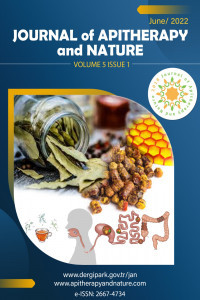Application of Natural Deep Eutectic Solvents for Green Extraction of Bioactive Compounds from Poplar Propolis: A Preliminary Study
Application of Natural Deep Eutectic Solvents for Green Extraction of Bioactive Compounds from Poplar Propolis: A Preliminary Study
Natural deep eutectic solvents, Deep eutectic solvents, Propolis,
___
- .
- Yayın Aralığı: Yılda 2 Sayı
- Başlangıç: 2018
- Yayıncı: Oktay YILDIZ
Effect of Brazilian Propolis-containing Ointment on Genital Itching in Menopausal Women
Hiroshi MIURA, Yasuko MIURA, Yuki SHIMODA, Satoko KAGABU, Hiromitsu TSUBAKI, Yukihiro TERADA
Antituberculosis Activity of Propolis
Jarosław WIDELSKI, Joanna GOLUS, Piotr OKIŃCZYC, Rafał SAWICKI, Grażyna GINALSKA, Tomasz MROCZEK, Zuriyadda SAKIPOVA, İoanna CHINOU, Krystyna SKALICKA-WOŹNIAK
Muhammad IQBAL, Tai-ping FAN, David WATSON, Sameah ALENEZI, Muhamad SAHLAN
Chemical Profiling of Tropical Propolis: Challenges and New Data
Milana POPOVA, Boryana TRUSHEVA, Kristina GEORGIEVA, Vassya BANKOVA
Chemical Composition of Selected Propolis Samples from Kyrgyzstan and Kazakhstan
Argyro PETROPOULOU, Konstantia GRAIKOU, Jaroslaw WIDELSKI, Krystyna SKALICKA-WOŹNIAK, Zuriyadda SAKIPOVA, İoanna CHINOU
ARC (Apiceutical Research Centre): Exploring a New Generation of Medicines from the Beehive
Qualitative Analysis and Biological Evaluation of Propolis from Armenia and Georgia
Argyro PETROPOULOU, İoanna CHINOU, Konstantia GRAIKOU
Caseinates Loaded with Red Propolis Extract
İsabel Cristina Celerino De Moraes PORTO, Clinston Paulino De ALMEIDA, Nataly Miranda Do NASCIMENTO, Amanda Barbosa WANDERLEY, João V. Lessa De OLIVEIRA, Felipe J. L. Barbosa Dos SANTOS, Valdemir Da Costa SILVA, İrinaldo Diniz BASÍLIO-JÚNIOR, Giselda Macena LIRA, Marta Maria Da CONCEIÇÃO, Ana Flávia
Erzsébet-timea DOMOKOS, Adriana URCAN, Liviu Alexandru MARGITAS, Daniel Severus DEZMIREAN, Otilia BOBIS
Anticancer Properties of Aqueous and Nonaqueous Propolis Extracts
Zbigniev BALION, Aistė JEKABSONE, Kristina RAMANAUSKIENE, Daiva MAJIENĖ
